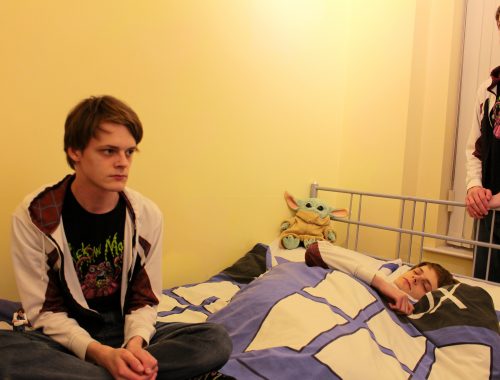One step back, two steps forward. The success of goal setting.
Working on a project with a high workforce turnover has both its benefits and challenges. A team can build on the success and progress of the team that came before them with a good insight into the problems that lie ahead. But you can find yourself reluctant to disassemble some of the work that came before you, out of respect to your former peers. In order to make progress however, one must set themselves ambitious goals, and pursue them with conviction. Using Borton’s reflective model (Borton), this blog will reflect on the choices and progress made when embarking on my work-based learning placement.

(TU Dublin Library Services)
I was involved in the SARC Radio project from its inception, producing weekly content for the stations schedule in the second year of my undergraduate degree. Towards the end of the year, I was offered a work-placement opportunity taking charge of the scheduling of content and maintenance of the playout system. I was able to shadow and learn from my predecessor about the scheduling, playout and auto-DJ systems that we were using. The software was complex, and had taken my colleague hours upon hours to set up but it was still frequently having issues, with some shows going out at the wrong time/not at all, and the station frequently broadcasting dead air.
Heading into the placement I had two goals that I wanted to achieve by the end of the year. I am a firm believer in Goal Setting Theory which has proven through study that those who give themselves more ambitious goals will accomplish more with their work. (Wiese, and Freund).
“So long as a person is commited to the goal, has the requisite ability to attain it and does not have conflicting goals, there is a positive linear relationship between goal difficulty and task performance.” (Locke, and Latham)
This project is about progress year on year, and since it is still in its infancy, my ambitions for the project need to push it on as much as possible, to allow it to grow after my placement is over and next year’s team takes over. My goals for the project are as follows:
- Develop a way to easily teach all maintenance and operating procedures of the station to other members of the team and future team members.
- Feature frequent live programming in an effort to move away from pre-recorded content and increase programme quality and variety.
These are challenging targets to hit given the small team size and complex software that the station uses. However, if we follow the teachings of Goal Setting Theory, we can accomplish more with our work if we set ourselves ambitious targets, no matter if they are fulfilled or not.
WHAT
One of the first tasks that I was given was to become more familiar with our playout system. Having looked at the system I was also struggling to overcome the problems we were facing the previous year. I felt that I had a choice to make if I was to make any progress.
- Continue to try and fix the current software issues that we were encountering, despite the complexity of the system and our failures to find a solution so far.
- Find and set-up an entirely new software that is easier to use, even though we would have to learn how to use it and move all of our existing data onto the new system.
Following the lessons learnt from Goal Setting Theory, I pushed for the more ambitious option of finding new software to use. We installed a new computer into the radio studio and moved all of the files from the old computer onto the new one with a brand-new playout system in place. This was more time-consuming than we had anticipated, so we ran the old system simultaneously to keep the station running while we upgraded the software.
SO WHAT?
This transition succeeded in simplifying the software situation at SARC Radio. The new software has far more information available online to troubleshoot issues and has a much better user interface, making it far easier to schedule content reliably, therefore solving the problems we were facing in the previous year.
The new system’s ease of use will not only make my work for the year far simpler, but also simplify the handover process when next year’s team need to learn the stations procedures. I feel more confident teaching others to use this software than the previous iteration of SARC Radio’s automation software.
We can now also keep accurate records of the playout log, ensuring that the artists receive the correct royalties when we play their music.
The new system had the unexpected benefit of supporting live broadcasts as well, the first step in accomplishing one of my personal goals of bringing live programming to the station, which has been operating exclusively on pre-recorded material to this point.
NOW WHAT?
With our new capabilities, we can now trial some live programming ideas that other members of the team have been developing. An exciting programme interviewing music students about their creative process is close to being ready to air, and other ideas about career choices, sound psychology and professional guest features are now in the development phase.
Given that my workload of scheduling content and maintaining the system has become easier, I feel that I can now become more involved in the creative side of the station, writing and recording new station imaging and making the existing shows sound smoother when they air.
Setting ambitious goals has allowed us to create a far better station setup than we would have been able to produce if we had chosen the safer option of continuing with the old software. I now feel capable of achieving my own goals for the year, thanks to the progress we have made so far.
Bibliography
Borton, Terry, Reach, Touch And Teach. Mcgraw-Hill, 1970.
Locke, Edwin A, and Latham, Gary. “New Directions In Goal-Setting Theory”. Current Directions in Psychological Science, vol 15, no.5, 2006, pp 265-268. SAGE Publications, doi:10.1111/j.1467-8721.2006.0049.x.
TU Dublin Library Services. Overview of Driscoll’s Reflective model. 2020, https://tudublin.libguides.com/c.php?g=684780&p=4891210. Accessed 25 Nov 2021.
Wiese, Bettina, and Freund, Alexandra. “Goal Progress Makes One Happy, Or Does It? Longitudinal Findings From The Work Domain”. Journal Of Occupational And Organizational Psychology, vol 78, no.2, pp287-304. Wiley, doi:10.1348/096317905×26714.
You May Also Like

AAAH or (Why Tom sucks at selling himself)
25 November 2021
Learning from experience- Am I on the right track?
28 November 2021
